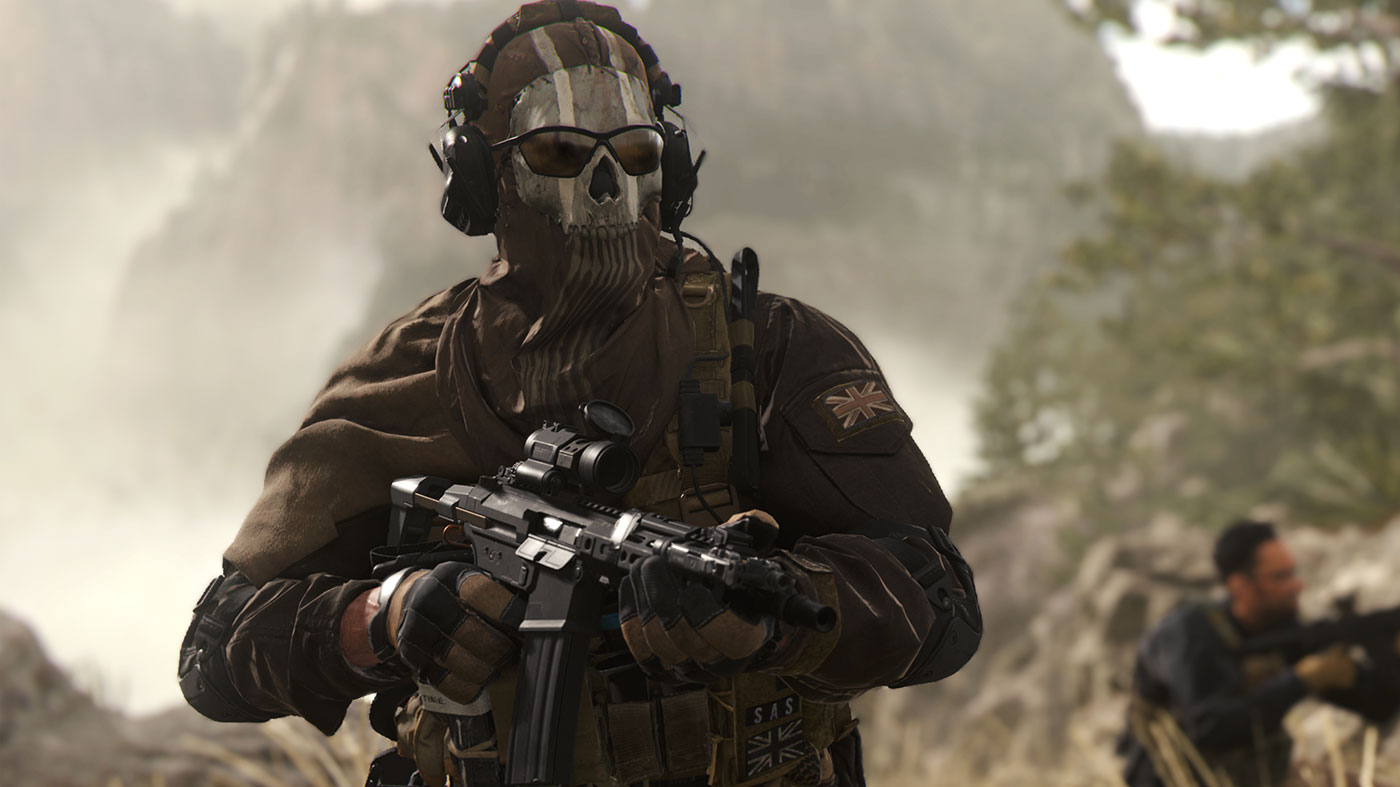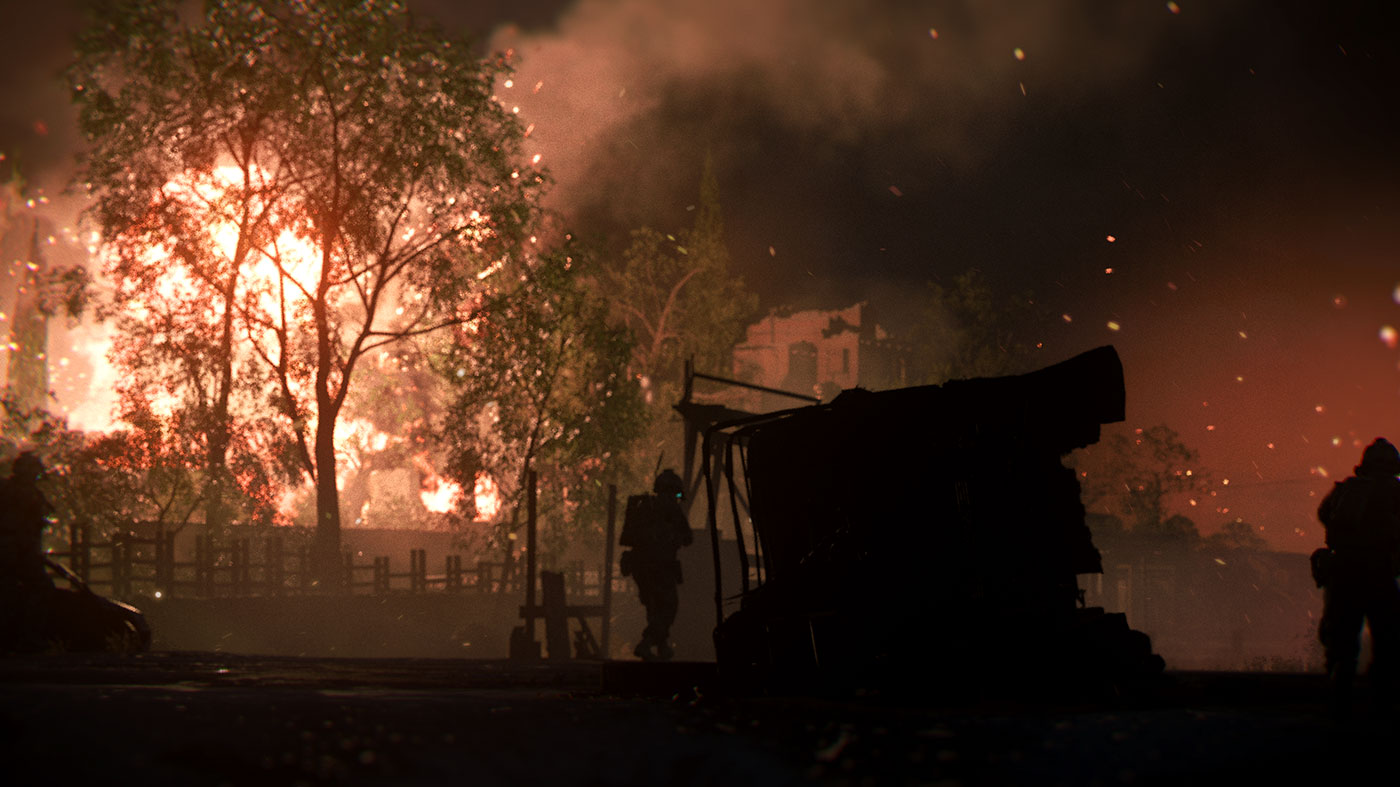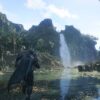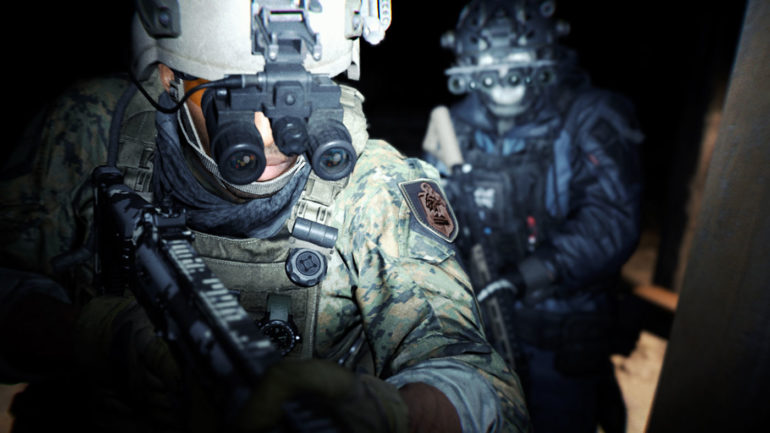During our visit to Infinity Ward’s Los Angeles studio for a briefing on the obviously expected but recently confirmed Call of Duty: Modern Warfare II, the follow-up to 2019’s Modern Warfare reboot, we got a chance to sit down with Jeff Negus and Brian Bloom, who serves as Infinity Ward’s Narrative Director and Head Writer respectively.
They’re both charged with bringing the characters and tying the game’s bombastic, explosive events together with narrative. To put it another way, they somehow make sense of the chaos that can be Call of Duty.
We discussed the challenges that presented as a result of remote working, how they handle working with legacy characters, defining ‘fun’ within Call of Duty, as well as their dream of writing for a revival of the television series Gamora.
The Best Call Of Duty: Modern Warfare II Pre-Order Deals
Press Start: So the studio had to mix working from home with studio work. Obviously, that would have presented a lot of challenges, but how has that personally affected the both of you?
Jeff: I mean a ton, but it’s mostly good, to be honest. You know, Brian and I work super closely whether we’re in the office or not. Tons of Zoom sessions, all that stuff. Plus our narrative team is super diligent about getting together and really this whole team has been making the best out of this crazy situation and really doing some awesome things with it.
Our part of it is a little different, too, because we’re tasked with bringing some of the more carbon-based life forms into the game, infusing some humanity and emotion, and drama. And so, more different than we’ve ever done it before, we cast this game entirely on Zoom. That was a trip, I was hoping that when we get to stage that’s the guy that we thought it was on the call.
Brian: Good news is everybody was better than we thought they were gonna be, no exception.
Jeff: Yeah. And then there’s the other side of it, too. We’ve shot a lot of days on our motion capture set and made it work safely and nobody’s gotten sick.
Brian: Through some of the big spikes and surges, following all the protocols. And really strictly, in fact. In many cases, you know, over-following because we were putting people together. Although it’s voluntary, you don’t have to take the job, you don’t have to do the work, but if we’re going to do it, we were so overly cautious through the process to make sure that we weren’t uprooting anybody’s life with anything other than a great day’s work when it was over.
So we did everything we could. But it was awesome that, while the rest of the world at large, no matter what jobs they were in or people on our team were working in a completely distributed model, we had many, many days every month when we were getting together–we have our own stage and we shoot our motion capture and performance capture, we’re very lucky to have that stage. We record our audio there as well. We had a chance in a locked-down world to get together.
And even though people were masked, wearing shields and doing other things, we eventually got those masks off of the actors. And and we were able to communicate and commiserate. And again, our job is to put some of the chemistry into the ones and zeroes here and to breathe in some of that life. And to find a way that our machine can take those performances, physical, the sound, the expressions on faces depending on whether rendered, pre-rendered, cinematic, in-game, they’re all different elements.
So when dealing with some of these fan-favorite legacy characters, do you feel like there’s a responsibility to sort of honour what has come before for those characters? Brain, you said you’d been on Call of Duty since 2004, so you’d have your own relationship with these guys.
Jeff: Something that we enjoy, or relish, about this process is in the idea of rebooting with the last game that we can go back and sort of mine things we really like, or things that really resonate with the audience, or pick out the things that work for this story. And take what’s happening or modern right now and be able to strike a balance between leaning into some of the things that make them fan favorites and also building upon them in such a way that it makes them feel bigger than what they were before. And in some ways, trying to find a way to subvert expectations and make it fresh and make it new.
Brian: There are aspects of ‘Ghost’, for example. He doesn’t say much, he is the man behind the mask and you could definitely pull that from the earlier entries in the franchise. But we took an opportunity to add some more dimension to that. What would that really mean on a team, a guy who doesn’t say much and wants to work alone, what would the implications be?
What would the ramifications be and how could you use that? How is it a bug in his character? How is it a feature? How is it a flaw? And what challenges or strengths does it provide? And if character is story and story is character, and we certainly think it is, then who somebody is and how they operate and what their personality is—what you would call characterization—if you’re doing it remotely right, that’s going to have some effect on what happens next. And that’s where the character side of all this comes in.

To try and follow on from what you were saying about how taking the familiar and making it feel different and bigger, I did notice that in 2019’s Modern Warfare, with it being a reboot, it didn’t seem to retread any of those iconic moments that resonated with fans. Does Modern Warfare II feature any particular story beats that fans might recognise?
Jeff: I think that there are a bunch of ways that you might be able to find a comparison, but we’re definitely after trying to tell a new story. Something new when even compared to the last game, it’s three years after what happened to them then. And as it pertains to the original series, we definitely pull from certain things that really resonate with us while trying to listen to this story and see what this story really needs.
Brian: What’s awesome about working on something of this size is that even if there weren’t links, people would find places that they thought that there were. And maybe they’d be right. Whether we agreed or not, it’s incredible how people own these stories and these characters in their own way and sort of take possession of them. And we appreciate all of that.
And sometimes people find circuitry that isn’t really there and it becomes part of the lore, which we listen to and learn from and find things in it. There is something—but no spoilers—there are certain characters and certain scenarios that may be familiar. There may be expectations based on who they are and how they might fit into a narrative like this.
I won’t presume to know what you’re talking about, but just know if Shepherd kills Ghost again, people will riot. Spoilers for a decades-old game. It was alluded to that while there won’t be anything like ‘No Russian’ in terms of provocation and controversy, that players might still be put into situations where caution is essential. Are you able to elaborate at all on what those sorts of situations might be?
Brian: In some of our missions, there are civilians present. There was no random nature in 2019’s Modern Warfare, as far as we’re concerned. It was all very specific and justified based on what that target was, who was there and Piccadilly being Piccadilly. But in the new game, without giving anything away, our players are often dealing with high-value targets or looking for items—let’s call it a McGuffin for now—in places where innocent people could get hurt. And we absolutely do not condone or encourage our players to test those things.
Jeff: Your quote about “the imperfect men”.
Brian: Yeah. We’ve talked with our advisors quite a bit, whether they be Mexican advisors or American SEAL Team Six guys, or SAS or SBS. But the SEAL Team Six guys, in particular, have told us: “We’re highly trained but imperfect, men, asked to do an imperfect job perfectly well.”
And one of the factors in that is collateral damage and doing your best to have none and to create none.
Jeff: We’re not here to sensationalize. We’re here to ground and ultimately Modern Warfare, conceptually, is not simple. And it takes these very highly trained people to do this very specific job.
Brian: And the word fun is used. Is it fun? Well, fun can also equal excitement and it can equal drama from stakes and adventure and achieving it and doing it right. And pulling that off and prosecuting the target without collateral damage and achieving your objective heroically, creatively, thoughtfully, and mindfully. I mean, that’s all part of the proverbial quote, unquote fun here, it’s playing the game and, and playing along with the game. And we leave space for you to play it your way to some extent and figure out how you might want to infil the target, where you might want to go, and what weapon you want to use.
And if you want to go stealth, go hot, go loud. And all of those things are part of the fun, even if the situation is provocative, serious and high stakes, that’s how special operators often work.
They’re deployed into austere circumstances where you’re tested. War stories have to be some of the best stories because those conflicts and the stakes are high, terminal, mortal, serious. Achieving objectives for the greater good, hopefully.
Jeff: What better way to reveal who these people are than through those ultra-high stakes.
Brian: It’s easy to be cool and roll with the punches but what happens when the heat gets turned on? So, that’s part of the fun.

Obviously, the live-action trailer dropped this morning. I’ve seen a lot of people commenting on it and I tend to agree that it gives me really big Sicario vibes. Have you looked to that film in particular or did the setting develop organically from Modern Warfare?
Brian: If we can ask you a question, what about it gives you Sicario vibes?
I guess it’s a combination of the setting and the convoy ambush, it feels sort of drawn from that source material. I don’t know whether it’s based in that or not. I think people just see the similarities.
Brian: Do you think if Alejandro weren’t there you’d think that?
Yeah, that’s a fair question.
Brian: Yeah, I was just curious, it’s not a test and you’re not wrong and it’s a great way to look at it.
I’m literally asking because we haven’t seen this, we’re here right now. You’re following all this. That’s late-breaking news to us in this moment that people are feeling that way. [laughs]
Look, we love that movie. That movie’s awesome. And those characters have inspired us for more than a game now in many ways. They’re part of a bigger kind of pallet of things, that were colors, that we’ve looked at and thought that was interesting. And it was always what those guys were doing, what they were up against—even divorcing from their narrative—some of their characters and what they were willing to do and the complications of what they were willing to do and what that did to who they were, what that said about who they were. And what that really did to those guys on their journey, being who they were and then who they became was, when you put the two films together—a set up and a payoff—for two character arcs of guys that were working together and then on a collision course.
It’s interesting stuff.
That’s not our story by any means.
Jeff: It’s interesting, though. Brian talks about the palette that we pull from, there’s obviously a ton of references that go into making a game like this just because it’s so varied, it’s so globe-trotting, and everything. That one’s [Sicario] really special in terms of tone, in terms of the way that it treats ambiguity, and the way that it treats how things are resolved or not. Obviously the shooting of it is like our cinematic team was just like, okay, let’s look at, let’s look at how this scene was put together, the way that things are blocked. There’s just a lot of great inspiration.
Brian: We’re inspired by so much television too. We all know that the last half a decade, or more really…
Jeff: It’s been a golden age.
Brian: Yeah. But we’re making a product that’s different than all those things in so many ways but one of the chief ways that it’s different is this thing called player agency. Those are fully authored stories, and ours are authored too, but you play them. And if you, depending on where you do it, if you put the controller down, either nothing happens or it ends because you take damage. You need to use and bring to bear, all of the mechanics that we give you and the weapons and other things and, again, choose them and choose to use them how you want to.
So it’s definitely not a movie. It’s definitely not a television show, but it’s awesome to be inspired by all those things. And we think we made the best game we’ve ever made. And we’re excited that people are digging on what came out today for sure.
This is less about Modern Warfare II and more fantasy. So let’s assume the Xbox acquisition goes through and then the impossible happens: Infinity Ward gets taken off Call of Duty. What’s one IP that you guys would both love to write for?
Brian: I mean that’s a really interesting and exciting question, and I don’t want to dodge it, but I want to tell you that we’re so heads down. We might be sitting here with you right now, but we’re also 50% in our heads working on the rest of the game at this very moment.
I don’t think it’s even healthy for us, and fair to our audience, to think about even fantasising about working on something else. Right now, we’re fantasising about getting back to work on this today.
Jeff: It’s totally true. I don’t wanna dodge it either. But it’s also to say, too, that we’re just such fans of like so many things. There are so many awesome games that are being made right now, and so many awesome studios out there. So, we would be lucky to be a part of any of those things, but we consider ourselves super lucky to be making this game right now.
Brian: I can tell you one thing, if they were bringing back Gamora. I’d love to write.
Jeff: Oh my God. Have you watched the television show Gamora?
I don’t think I have.
Brian: Oh, man. We’re almost done with season four.
What’s the elevator pitch for it?
Brian: Mafia in Naples.
Jeff: Modern day. And talk about ripped from the headlines. It’s just… [chef’s kiss]
Brian: It really is, it’s so awesome. I’m gonna work on that. [laughs]



